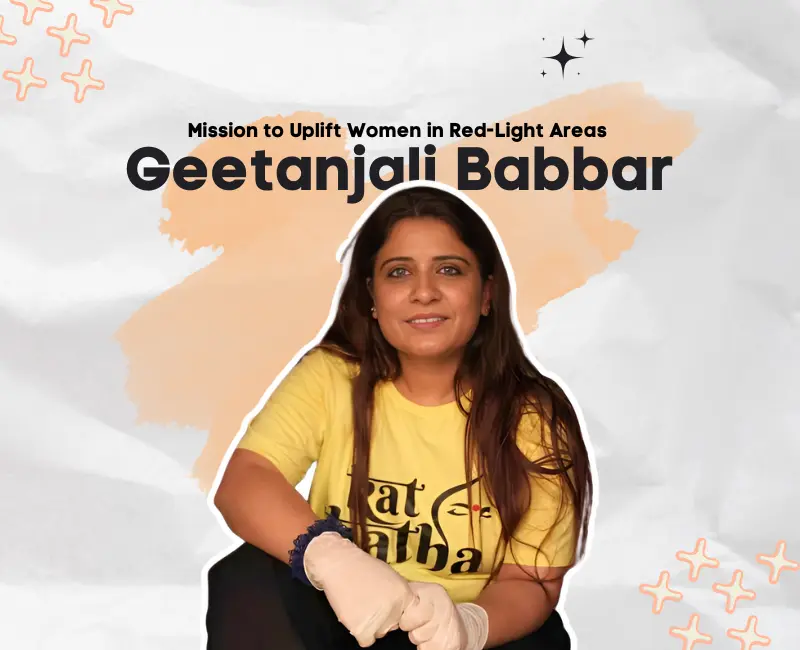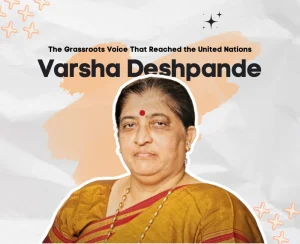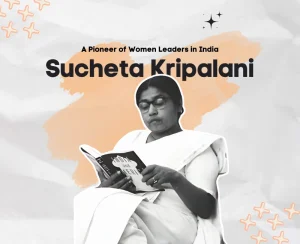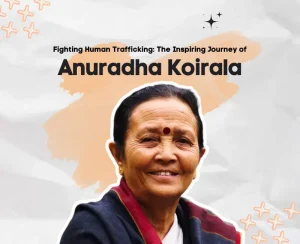Breaking Barriers: Geetanjali Babbar’s Mission to Uplift Women in Red-Light Areas

The narrow lanes of Delhi’s GB Road tell thousands of untold stories. But among these stories of struggle emerges one of hope – that of Geetanjali Babbar, a woman who dared to look beyond society’s prejudices and dedicated her life to empowering women trapped in the sex trade.
When she first entered these lanes in 2011, she didn’t bring grand solutions or massive funding. Instead, she brought something far more powerful: unwavering compassion and a simple question: ‘How can I help?’
Today, through her organization Kat-Katha, Babbar has transformed the lives of hundreds of women and their children, turning brothels into classrooms and creating spaces where dreams dare to take flight.
But this isn’t just a story about social work – it’s a testament to how authentic human connection can break through the strongest barriers society builds.
‘Every woman here has a story that deserves to be heard,’ says Babbar. ‘These aren’t just statistics; they’re mothers, daughters, and sisters who’ve been dealt a difficult hand but possess incredible strength to change their narratives.”
The Journey Begins
Growing up in a middle-class Delhi family, Geetanjali Babbar’s early life did not indicate the revolutionary path she would eventually choose. As a child, she was deeply influenced by her grandfather’s teachings about social justice and equality.
“My grandfather always said, ‘If you have the privilege of education, you have the responsibility to lift others,'” Babbar recalls. “Those words shaped my worldview, though I didn’t realize their full impact until much later.”
After completing her Master’s in Social Work from Delhi University, Babbar worked briefly in corporate communications. However, a chance encounter in 2011 would forever alter her trajectory.
The Turning Point
Babbar visited GB Road, Delhi’s largest red-light district, during a routine assignment. What was meant to be a brief visit turned into a life-altering experience.
“I saw children playing in the corridors of brothels, women peering from behind iron bars, and a system that had normalized human suffering,” she shares. “But what struck me most wasn’t their poverty or conditions – their resigned acceptance of their fate. That’s when I knew I had to do something.”
The Birth of Kat-Katha: From Vision to Reality (2011-2012)
Geetanjali Babbar’s decision to leave behind a secure career to work in the challenging environment of GB Road marked the beginning of her transformative journey.
Her NGO, Kat-Katha, was not created on a linear path but a testament to persistence, resourcefulness, and deep empathy.
Kat-Katha, which translates to “a puppet’s story,” symbolizes the manipulation and control often experienced by sex workers. Babbar envisioned her NGO as a platform to give these women the tools to reclaim their autonomy and rewrite their stories.
The initial phase of founding the organization, spanning 2011 to 2012, was fraught with obstacles. However, Babbar’s determination to make a difference turned these hurdles into stepping stones for change.
Initial Challenges
One of the most significant challenges Babbar faced was gaining the trust of the sex workers she sought to help. Years of exploitation and broken promises had made the women wary of outsiders.
- Daily Visits to Build Rapport: Babbar dedicated herself to daily visits to GB Road’s brothels, engaging in heartfelt conversations with the women. She listened to their stories without judgment, slowly breaking through mistrust.
- Facing Initial Resistance and Skepticism: Many women were initially skeptical of Babbar’s intentions, questioning why someone outside their world would want to help. Her sincerity and unwavering presence eventually won them over.
- Overcoming Community Suspicion: Gaining access to GB Road’s tightly knit and often suspicious community required patience and respect for their boundaries. Babbar approached this humbly, ensuring her actions spoke louder than her words.
- Establishing Credibility with Stakeholders: Babbar also had to build relationships with local authorities, community leaders, and other stakeholders, convincing them of her genuine intentions and long-term vision for change.
Resource Constraints
As with many grassroots movements, Kat-Katha’s early days were marked by limited resources. Babbar’s resourcefulness during this period underscores her commitment to the cause.
- Starting with Personal Savings: Babbar poured her savings into the initiative, funding everything from transportation to essential supplies for her outreach efforts.
- Operating Without Formal Funding: Without institutional or governmental backing, Babbar relied on small donations from friends and well-wishers. Despite the financial strain, she never compromised on her vision.
- Managing with Limited Volunteers: In the early stages, Kat-Katha operated with a small team of dedicated volunteers who shared Babbar’s passion. These individuals worked tirelessly, often taking on multiple roles to keep the NGO functioning.
- Working Around Space Limitations: Without a formal office or center, Babbar and her team utilized whatever spaces were available—sometimes meeting in cramped brothel rooms or makeshift shelters—to conduct workshops and counseling sessions.
The Power of Education
A turning point in Geetanjali Babbar’s journey came when she initiated a small reading circle in a brothel corridor. One woman’s simple request to learn how to write her name sparked the start of Kat-Katha’s first class.
Early Initiatives:
- Basic literacy classes to empower women with foundational skills.
- Informal education sessions covering practical knowledge and awareness.
- Life skills workshops to build confidence and independence.
- Safe spaces for kids to learn & grow away from the brothel environment.
This marked the beginning of a transformative movement that used education as a tool for change.
Programs and Impact – Transforming Lives Through Holistic Intervention
Kat-Katha’s mission goes beyond providing temporary relief; it strives to empower the residents of GB Road with sustainable tools for transformation. The NGO addresses critical aspects of education, skill-building, mental health, and child welfare through well-structured programs, creating a ripple effect of change across the community.
Educational Programs
Education is a cornerstone of Kat-Katha’s efforts. By offering accessible learning opportunities, the organization helps women and children from GB Road envision a future beyond their current circumstances.
- Adult Literacy Classes: Women who have never had the chance to attend school are taught essential reading and writing skills, which empower them to navigate the world more independently.
- Formal Education for Children: Kat-Katha ensures children from the brothels have access to formal education, often bridging the gap between their environment and mainstream schools.
- Bridge Courses for School Integration: These tailored courses help children catch up on missed schooling and seamlessly integrate into regular classrooms.
- Digital Literacy Training: By teaching digital skills, Kat-Katha equips participants with tools to thrive in a technology-driven world.
Skill Development
Economic independence is crucial for breaking the cycle of exploitation. Kat-Katha offers vocational training and entrepreneurship programs to empower women with alternative livelihoods.
- Vocational Training Programs: Women are trained in crafts such as tailoring, embroidery, and handicraft-making, helping them earn a sustainable income.
- Entrepreneurship Workshops: These sessions teach the basics of starting and managing small businesses, enabling women to become self-reliant.
- Financial Literacy Sessions: Participants are taught essential financial skills, such as budgeting and saving, to manage their earnings effectively.
- Computer Skills Training: Providing foundational computer skills opens up new avenues for employment in administrative and digital fields.
Mental Health Support
The trauma faced by GB Road’s residents necessitates comprehensive mental health interventions. Kat-Katha prioritizes emotional healing alongside other support systems.
- Individual Counseling: One-on-one sessions offer women a secure area to share their experiences and begin the healing process.
- Group Therapy Sessions: These sessions foster a sense of community and mutual support among participants, breaking the isolation they often experience.
- Art Therapy Workshops: Creative expression is a therapeutic tool that allows participants to process their emotions and build resilience.
- Trauma Healing Programs: Tailored programs address deep-seated trauma, helping individuals rebuild their self-esteem and confidence.
Child Welfare Initiatives
Children of GB Road are often the most vulnerable. Kat-Katha’s child welfare programs ensure their well-being and secure a brighter future.
- Early Childhood Education: Play-based learning and foundational literacy give young children a head start in their education.
- After-School Support: Older children receive tutoring and homework assistance to help them excel academically.
- Nutrition Programs: Regular meals and nutrition education ensure children receive the nourishment they need for healthy development.
- Recreation Activities: Sports, arts, and extracurricular activities give children a sense of normalcy and joy.
Recognition and Accolades
Geetanjali Babbar’s unwavering commitment to uplifting marginalized women has earned her widespread recognition and accolades. Her work has been celebrated across national and international platforms, reflecting the profound impact of her mission.
- NDTV Indian of the Year (2016): Babbar was honored in the Social Service category for her groundbreaking efforts to transform the lives of sex workers and their families.
- United Nations Recognition: Babbar’s dedication to human rights advocacy and empowering women in vulnerable communities earned her acknowledgment from the UN.
- Media Features and TEDx Talks: Her amazing journey has been covered by major media outlets and platforms, including TEDx, where she discussed her vision and the challenges of her profession.
Despite these accolades, Babbar remains grounded, emphasizing that her valid reward transforms lives—seeing women on GB Road reclaim their identities, dignity, and dreams. For her, every step forward taken by the women and children she supports is a personal victory, far more fulfilling than any formal recognition.
Expanding the Mission
At just 35, Geetanjali Babbar’s vision remains dynamic and far-reaching. She aspires to create a self-sustaining ecosystem where women can rise above systemic barriers, achieve independence, and rebuild their lives with dignity.
Her plans aim to address immediate needs and long-term solutions, ensuring the progress made through Kat-Katha is sustainable and transformative.
Training Centers
Babbar envisions establishing training centers to nurture the next generation of social workers and activists. These centers would focus on:
- Equipping young individuals with practical skills and knowledge for effective community engagement.
- Sharing best practices for working with marginalized communities.
- Creating a network of empowered changemakers who can replicate and amplify her model across other vulnerable regions.
Modern Medical Facilities
Recognizing the critical importance of healthcare, Babbar plans to set up modern medical facilities tailored to the unique challenges faced by sex workers and their children. These facilities would include:
- Regular health check-ups focusing on reproductive and mental health.
- Accessible counseling services to address trauma and build resilience.
- Specialized pediatric care to ensure a healthy future for the next generation.
Research on Gender and Livelihoods
Babbar’s future endeavors also emphasize the need for research and data-driven insights. By conducting studies on the intersection of gender, poverty, and employment, she aims to:
- Identify sustainable livelihood options for marginalized women.
- Advocate for policies that find out the underlying causes of exploitation.
- Develop a roadmap for systemic interventions to support vulnerable communities globally.
Lessons from Geetanjali Babbar’s Journey
Geetanjali Babbar’s life is a profound testament to the power of empathy, resilience, and vision. Her journey offers valuable lessons that resonate far beyond the red-light areas of Delhi, inspiring individuals and societies worldwide.
- Empathy Transcends Boundaries
Babbar’s story underscores the importance of meeting people where they are. By prioritizing understanding and compassion, she has forged trust and initiated meaningful change in a community often shunned by society.
- Perseverance Creates Impact
Her work reminds us that transformation is neither immediate nor easy. Babbar faced resistance, skepticism, and criticism but persevered, demonstrating that persistence is the cornerstone of lasting impact.
- One Person Can Make a Difference
Babbar’s journey proves that a single individual, armed with conviction and a willingness to act, can challenge entrenched systems and inspire systemic change. Her work reminds us that every effort, no matter how small, has the potential to ripple outward and transform lives.
How to Support the Cause
Geetanjali Babbar’s mission to uplift women in red-light areas needs collective support. Here are simple ways to help Kat-Katha make a more significant impact:
1. Volunteer Your Time
Your skills and time can create a lasting difference:
- Teach and Mentor: Help women and children by teaching basic literacy job skills or providing guidance.
- Share Skills: Offer training in tailoring, digital tools, or crafts to help them earn a livelihood.
- Assist Behind the Scenes: Support with tasks like organizing events, managing data, or writing proposals.
- Help with Projects: Join initiatives like healthcare drives, workshops, or cultural programs.
2. Contribute Resources
Donations and materials keep the programs running:
- Donate Money: Help fund education, healthcare, and counseling programs. Every little bit counts.
- Supplies: Give books, clothes, medical kits, or tools like sewing machines to support learning and income generation.
- Offer Services: Volunteer professional help like legal advice, medical care, or mental health support.
- Technical Help: Assist with digital tools or social media to amplify their reach.
3. Advocate for Change
Spread the word to inspire others to join the cause:
- Raise Awareness: Share Kat-Katha’s mission and stories on social media or with friends.
- Promote Success Stories: Highlight how lives have been transformed to challenge stereotypes.
- Join Campaigns: Support fundraising events, awareness drives, or policy petitions.
- Build Networks: Connect Kat-Katha with businesses, other NGOs, or policymakers for collaboration.
Why It Matters
Your support helps Kat-Katha continue transforming lives, offering hope, dignity, and a better future for women and children in red-light areas. Together, we can break barriers & create lasting change.
Conclusion
Geetanjali Babbar’s work through Kat-Katha demonstrates how dedicated action can create ripples of change in the most challenging circumstances.
Her journey from a corporate professional to a changemaker illustrates that transformative social impact often begins with a simple decision to care.
As she continues her mission, Babbar remains focused on her ultimate goal: “Our work isn’t just about providing services; it’s about restoring dignity and helping every woman recognize her inherent worth. When that happens, transformation is inevitable.”


